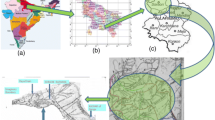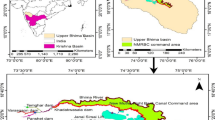Abstract
Multiobjective fuzzy methodology is applied to a case study of Khadakwasla complex irrigation project located near Pune city of Maharashtra State, India. Three objectives, namely, maximization of net benefits, crop production and labour employment are considered. Effect of reuse of wastewater on the planning scenario is also studied. Three membership functions, namely, nonlinear, hyperbolic and exponential are analyzed for multiobjective fuzzy optimization. In the present study, objective functions are considered as fuzzy in nature whereas inflows are considered as dependable. It is concluded that exponential and hyperbolic membership functions provided similar cropping pattern for most of the situations whereas nonlinear membership functions provided different cropping pattern. However, in all the three cases, irrigation intensities are more than the existing irrigation intensity.





Similar content being viewed by others
References
Bit AK, Biswal MP, Alam SS (1992) Fuzzy programming approach to multicriteria decision making transportation problem. J Fuzzy Sets Syst 50:135–142
Carvallo HO, Holzapfel EA, Lopez MA, Marino MA (1998) Irrigated cropping optimization. J Irrig Drain Eng 124:67–72
Consoli S, Matarazzo B, Pappalardo N (2008) Operating rules of an irrigation purposes reservoir using multi-objective optimization. Water Resour Manag 22:551–564
Darshana PA, Ostrowski M, Pandey RP (2012) Simulation and optimization for irrigation and crop planning. Irrig Drain 61:178–188
Deep K, Singh KP, Kansal ML, Mohan C (2009) Management of multipurpose multi reservoir using fuzzy interactive Method. Water Resour Manag 23:2987–3003
Energy Transport and Water Department, Water Anchor (ETWWA) (2010) Improving Wastewater Use in Agriculture: An Emerging Priority, The World Bank (http://siteresources.worldbank.org/INTWAT/Resources/ESWWastewaterAg.pdf (Accessed on 12.12.2012)
FAO (2012). Wastewater treatment and use in agriculture. http://www.fao.org/docrep/T0551E/t0551e07.htm (Accessed on 12.12.2012)
Han Y, Huang YF, Wang GQ, Maqsood I (2011) A multi-objective linear programming model with interval parameters for water resources allocation in Dalian city. Water Resour Manag 25:449–463
Hussain I, Raschid L, Hanjra MA, Marikar F, van der Hoek W (2002) Wastewater use in agriculture: review of impacts and methodological issues in valuing impacts (With an extended list of bibliographical references). Working Paper 37. International Water Management Institute, Colombo
Jairaj PG, Vedula S (2000) Multireservoir system optimization using fuzzy mathematical programming. Water Resour Manag 14:457–472
Jairaj PG, Vedula S (2003) Modeling reservoir irrigation in uncertain hydrologic environment. J Irrig Drain Eng 129:164–172
Kagade KL, Bajaj VH (2009) Fuzzy approach with linear and some non-linear membership functions for solving multi-objective assignment problems. J Adv Comput Res 1:14–17
Kaur R, Wani SP, Singh AK, Lal K (2012) Waste water production, treatment and use in India (http://www.ais.unwater.org/ais/pluginfile.php/356/mod_page/content/111/CountryReport_India.pdf (Accessed on 12.12.2012)
Labadie JW (2004) Optimal operation of multireservoir systems: state-of-the-art review. J Water Resour Plan Manag 130:93–111
Loucks DP, Stedinger JR, Haith DA (1981) Water resources systems planning and analysis. Prentice-Hall, Englewood Cliffs
Lu HW, Huang GH, Lin YP, He L (2009) A two-step infinite α-cuts fuzzy linear programming method in determination of optimal allocation strategies in agricultural irrigation systems. Water Resour Manag 23:2249–2269
Maji CC, Heady EO (1980) Optimal reservoir management and crop planning under deterministic and stochastic inflows. J Am Water Resour Assoc 16:438–443
Manual on Sewerage and Sewage Treatment (1993) Central Public Health and Environmental Engineering Organization. Ministry of Urban Development, Govt of India, New Delhi
Mujumdar PP, Ghosh S (2008) Fuzzy Logic Based Approaches in Water Resources Systems Modeling, Practical Hydroinformatics, (Eds) R.J. Abrahart, Linda See and D. P. Solomatine, Water Science and Technology Library, Springer 68: 165–176
Net GroundWater Availability for Future Irrigation use (2008) Groundwater Survey and Development Agency, Pune
Raju KS, Nagesh Kumar D (2000) Irrigation planning of Sri Ram Sagar Project using multiobjective fuzzy linear programming. Indian Soc Hydraul 6:55–63
Raju KS, Nagesh Kumar D (2010) Multicriterion analysis in engineering and management. PHI learning private limited, New Delhi
Rani D, Moreira MM (2010) Simulation–optimization modeling: a survey and potential application in reservoir systems operation. Water Resour Manag 24:1107–1138
Raul SK, Panda SN, Inamdar PM (2012) Sectoral conjunctive use planning for optimal cropping under hydrological uncertainty. J Irrig Drain Eng 138:145–155
Regulwar DG, Anand Raj P (2009) Multiobjective multi-reservoir optimization in fuzzy environment for river sub basin development and management. J Water Resour Prot 4:271–280
Regulwar DG, Gurav JB (2012) Sustainable irrigation planning with imprecise parameters under fuzzy environment. Water Resour Manag 26:3871–3892
Ross TJ (2010) Fuzzy logic with engineering applications, Wiley India
Sasikumar K, Mujumdar PP (1998) Fuzzy optimization model for water quality management of a river system. J Water Resour Plan Manag 124:79–88
Tan Q, Huang GH, Cai YP (2013) Multi-source multi-sector sustainable water supply under multiple uncertainties: an inexact fuzzy-stochastic quadratic programming approach. Water Resour Manag 27:451–473
Tirthkar SN (2009) Master plan 2025 of Pune Municipal Corporation for sewage treatment and disposal. J Inst Public Health Eng 2:13–19
Vedula S, Mujumdar PP, Chandra SG (2005) Conjunctive use modeling for multicrop irrigation. Agric Water Manag 73:193–221
Water Resources Department (2008) Khadakwasla complex project note, Government of Maharashtra
Wurbs RA (1993) Reservoir-system simulation and optimization models. J Water Resour Plan Manag 119:455–472
Yeh WWG (1985) Reservoir management and operations models: a state-of-the-art review. Water Resour Res 21:1797–1818
Zimmermann HJ (1996) Fuzzy set theory and its applications. Allied Publishers, New Delhi, India
Acknowledgments
Authors are grateful to Superintending Engineer and Executive Engineer of Khadakwasla Irrigation Project, for providing the data on Khadakwasla Project; Director, Groundwater Surveys and Development Agency, Pune for providing groundwater potential in Khadakwasla command; Divisional Joint Director, Agriculture, Pune, Division, for providing input on crop yield, crop pattern, crop prices; Executive Engineer, Minor Irrigation Div., Sub Div.1 for providing practical inputs of PLIS. Acknowledgements are due to Authorities at Mahatma Phule Krishi Vidyapeeth, Rahuri, (An Agricultural University) for providing most practical inputs on cost of cultivations for the region and cropping pattern, economics of agriculture.
Author information
Authors and Affiliations
Corresponding author
Rights and permissions
About this article
Cite this article
Morankar, D.V., Srinivasa Raju, K. & Nagesh Kumar, D. Integrated Sustainable Irrigation Planning with Multiobjective Fuzzy Optimization Approach. Water Resour Manage 27, 3981–4004 (2013). https://doi.org/10.1007/s11269-013-0391-3
Received:
Accepted:
Published:
Issue Date:
DOI: https://doi.org/10.1007/s11269-013-0391-3




